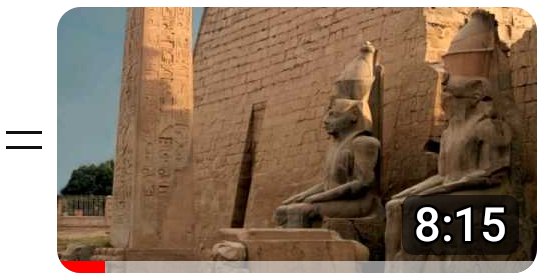Symbols of an Alien Sky | Clip #1異空のシンボル

1
"…When the planets,
In evil mixture to disorder wander,
What plagues and what portents! what mutiny!
What raging of the sea! shaking of earth!"
William Shakespeare
「... 惑星達が、
無秩序に邪悪な混合でさまようとき、
何という災いと、何という前兆でしょう!
なんという反乱だ!
なんと荒れ狂う海! 大地が揺れる!」
ウィリアム・シェイクスピア
2
The dance of the planets.
惑星達のダンス。
3
So regular and predictable one might think they've moved like this, forever.
これらは、とても規則的で予測可能なので、
人は、永遠に、これらのように、
移動していると思うかもしれません。
4
What a contrast to things, claimed by the first astronomers of ancient Mesopotamia and numerous cultures that followed.
古代メソポタミアや、その後の多くの文化の、
最初の天文学者たちが主張したこととは、
何と、対照的なのでしょう。
5
They watched planetary motions with a compulsive fear.
彼らは強迫的な恐怖を抱いて、
惑星の動きを観察しました。
6
Why would diligent astronomers insist that the planets were the towering gods of a prior time,
なぜ勤勉な天文学者たちは、
惑星は、かつてのそびえ立つ神であり、
7
planets ruled the destiny of kings and kingdoms and they were the agents of doomsday, the end of the world?
惑星は、王や王国の運命を支配し、
終末、つまり世界の終わりの、
代理人であったと主張するのでしょうか?
8
What was it about planets that inspired such reverence and fear?
惑星の何が、
そのような尊敬と恐怖を、
引き起こしたのでしょうか?
9
The Babylonian priests astronomer Burrouses said that planets moving on different courses than today, produced world catastrophe.
バビロニアの司祭天文学者ブローセスは、
惑星が現在とは異なるコースを移動し、
世界的な大惨事を引き起こしたと述べた。
10
In Greek Roman and Gnostic thought this was ecphrases, a catastrophic meeting of the planets but the memory of planetary disorder is echoed by numerous ancient sources.
ギリシャローマとグノーシス主義では、
ecphrases(叙述詩)だと思ったが、
惑星の破滅的な会合である惑星の無秩序の記憶は、
多くの古代の資料によって反映されています。
11
Plato expressed it, and so did Zoroastrian texts, the Hindu Mahabharata, Taoist teachings and the Chinese Bamboo books.
プラトンはそれを表現し、
ゾロアスター教のテキストもそうしました、
ヒンドゥー教のマハーバーラタ、
道教の教え、中国の竹本も同様に表現しました。
12
Far from the spotlight today, researchers are exploring these questions of planetary history.
今日、スポットライトから遠く離れて、
研究者たちは、惑星の歴史に関する、
これらの疑問を探求しています。
13
They bring wide-ranging backgrounds from comparative mythology to planetary science and plasma physics.
研究者たちは、比較神話から惑星科学、
プラズマ物理学に至るまで、幅広い背景を持ち込んで、
惑星史のこれらの疑問を探求しています。
14
All are asking if the solar system may have been unstable in the past alive with electrical activity.
太陽系は、過去に電気的な活動で、
不安定だったのではないかと、
誰もが疑問に思っています。
15
Allow this question to be asked and the doors open to a new understanding of the past of planetary history and the rise of civilization itself.
この質問を問うことで、
惑星の歴史の過去と、
文明そのものの興隆についての、
新しい理解への扉が開かれます。
16
When we hear the word civilization, most of us think of new technology economic advances rapid communication and expansive metropolitan vistas.
文明という言葉を聞くと、ほとんどの人は、
新しいテクノロジー、経済の進歩、急速な通信、
そして広大な都市の景観を思い浮かべます。
17
But earlier civilizations are much different, and they pose a mystery yet to be resolved.
しかし、初期の文明は大きく異なっており、
まだ解決されていない謎を抱えています。
18
Early civilizations were obsessed with the past all looked back to extraordinary events to an age of gods and wonders.
初期の文明は過去に執着しており、
神と驚異の時代までの、
異常な出来事を振り返っていました。
19
All insisted that powerful gods ruled for a time then went away.
強力な神々が、しばらく支配し、
その後、去ってしまったと誰もが主張した。
20
Monumental cultures arose and the monuments themselves meant much more than a display of technical skill, a monument commemorates something collectively remembered.
記念碑的な、文化が生まれ、
記念碑自体は、技術的なスキルの展示以上の意味を持ち、
記念碑は、集合的に記憶された何かを記念するものでした。
21
It was obsessive acts of remembering that shaped the early civilizations from the cities of Egypt stretched along the Nile to those of the Fertile Crescent of Mesopotamia from India to Southeast Asia and China.
ナイル川沿いに広がるエジプトの都市から、
インドから東南アジア、中国に至る、
メソポタミアの肥沃な三日月地帯の都市まで、
初期の文明を形作ったのは、記憶の強迫観念的な行為でした。
22
And no less so in the Americas from the early predecessors of the Aztecs and the Maya to the archaic cultures of the central Andes.
And no less so in the Americas from the early predecessors of the Aztecs and the Maya to the archaic cultures of the central Andes.
アステカ族やマヤ族の初期の先人から、
アンデス中央部の古文化に至るまで、
アメリカ大陸でも同様です。
23
All reveal a desperate urge to recover something lost.
どれも、失われた何かを、
取り戻したいという、
必死の衝動を明らかにしています。
24
Egyptian priests called this lost epic the age of the primeval gods.
エジプトの神官たちは、
この失われた叙事詩を、
原始の神々の時代と呼んだ。
25
It began with the rule of an earlier Sun God Atum who later departed.
それは、後に去った、
初期の太陽神アトゥムの支配から始まりました。
26
Cuneiform texts speak of the God on who ruled with.
Terrifying splendor, then fled the scene.
楔形文字は、神、誰が、
支配したかについて語っている。
恐ろしいほどの素晴らしさに、その場から逃走した。
27
The Greeks celebrated the lost age of Chronos.
ギリシャ人は、
クロノスの失われた時代を祝った。
28
But he too was replaced by another power the towering Zeus.
しかし、彼もまた、別の力、
そびえ立つゼウスに取って代わられました。
29
Sages of India likewise remembered the rule of Brahma though the God progressively faded into the background.
インドの賢者も同様に、
ブラフマーの支配を覚えていましたが、
神は徐々に背景に消えていきました。
30
So to the Chinese Shin di and Huangdi.
それは、中国の秦の始黄帝になります。
31
The Aztec Omecihuatl and the Maya Itzamna, all either departed for remote regions are faded from their original prominence.
アステカのオメチワトルとマヤのイツァムナは、
いずれも辺境の地へと旅立ち、
本来の姿は消え去ってしまった。
32
[Remembering the Gods]
[神々を偲ぶ]
33
"The broad spectrum of cultural responses to cataclysmic events attest to the profoundly unsetting impact chaotic events in the skies may have had."
David Pankenier
Lehigh University Virgil Aeneid
「大変動に対する文化的な反応の多さは、
空の混沌とした出来事がもたらしたかもしれない、
非常に不安定な影響を証明している」
デビッド・パンケニエ
リーハイ大学ヴァージル・アエネイス
34
Through festivals and symbolic rights the cultures remembered the lives of the gods,
祭りや象徴的な権利を通じて、
文化は神々の生活を思い出しました、
35
with every temple construction, every sacrifice, every harvest, every installation of a king, every royal marriage, every New Year Festival,
すべての神殿の建設、
すべての犠牲、
すべての収穫、
すべての王権の授与、
すべての王室の結婚、
すべての新年の祭り、
36
the celebrants reenacted critical turns in the lives of the gods themselves.
祭司たちは、神々自身の
人生における重要な転換を再現した。
37
Were you to remove the stories of the gods, there would be no cultural content left in the early civilizations.
神々の物語を取り除いたら、
初期の文明には、
文化的な内容は残っていないでしょう。
38
Who were the gods and why did the early astronomers declare that the most powerful gods were planets?
神とは誰だったのか、
そしてなぜ初期の天文学者は、
最も強力な神は惑星であると宣言したのか?
39
Here's a clue.
The mythic accounts are punctuated by terror and cosmic violence.
ここに手がかりがあります。
神話の記述は、
恐怖と宇宙の暴力によって中断されています。
40
Urgent prayers and hymns reenacted the deaths or ordeals of great gods recounting how one world age passed violently into another.
緊急の祈りと賛美歌は、
偉大な神々の死や試練を再現し、
ある世界の時代がどのようにして別の世界の時代に、
激しく移り変わったかを詳しく物語っていました。(^_^)